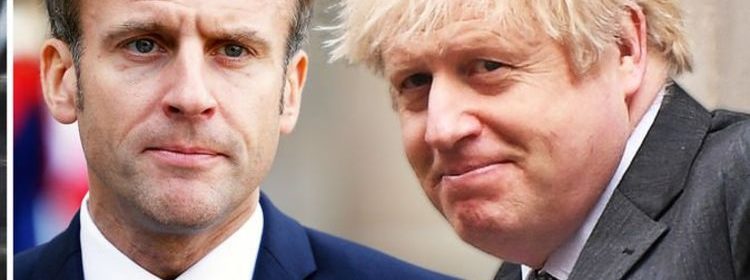‘Macron threats’ spurred London focus on being world’s most competitive financial centre

Dominic Raab dismisses EU threat to City of London
We use your sign-up to provide content in ways you’ve consented to and to improve our understanding of you. This may include adverts from us and 3rd parties based on our understanding. You can unsubscribe at any time. More info
The UK formally left the European Union on January 1, 2021 after a last-gasp trade deal that was signed between the two sides. It followed several months of tense and often bitter negotiations. But, following the historic Brexit referendum in June 2016, several predictions had been made suggesting tens of thousands of financial services jobs could end up moving out of Britain. There had been fears of a mass exodus of firms from the City of London due to the UK now being outside of the EU and now not privy to some of the financial service benefits it might have received.
But new data from Ernst and Young’s (EY) Financial Services Brexit Tracker shows the predicted exodus of companies has failed to materialise – with new forecasts for staff re-locations actually being revised down.
The total number of Brexit-related job re-locations to Europe has now fallen to just under 7,400 – down from 7,600 in December last year.
Daily Telegraph journalist Mutaz Ahmed believes the City of London has been given significant momentum by “threats” made by the likes of the EU and French President Mr Macron.
The newspaper has posted a video to YouTube entitled ‘Why Britain shouldn’t regret Brexit’.


Mr Ahmed says in the video: “Make no mistake, the City of London has always been innovative.
“But it is because of EU threats – threats from Brussels, threats from Macron and attempts to take business away from the City of London that it is really now focusing on making itself the most competitive financial capital in the world.”
Since the Brexit referendum in June 2016, just over 5,000 new hires in finance have been linked to Brexit with around 2,800 jobs created on the continent and 2,200 in the UK.
The relocation and movement of offices or assets to Europe has remained “muted” throughout the course of this year, according to the EY report.

Following the referendum, the number of firms planning to move staff and operations to the EU surged from 18 percent in December 2016 to 41 percent in January 2020.
But that increase has slowed significantly this year, rising only slightly to 44 percent by this month.
The London Stock Exchange (LSE) is also ending 2021 with the highest levels of fundraising for 14 years.
A total of 122 companies listed on the LSE raised over £16.8billion in initial public offerings (IPOs).
DON’T MISS
Covid LIVE: Another grim record as UK hits 189k cases [BLOG]
Insulate Britain activist shamed over own un-insulated home [VIDEO]
Next year is Brexit Britain’s year – here’s what’s in store for 2022 [OPINION]

In addition, £32.4billion was raised by listed companies providing further stock offerings.
These figures put London ahead of rival stock exchanges, raising more than the Amsterdam and Paris stock exchanges combined.
The group said in a statement the results confirmed “the UK’s position as one of the top global financial centres and a driver of the UK domestic economy – providing capital to the fast growth companies of today and tomorrow, as well as existing businesses.”
Nile Gardiner, a foreign policy analyst and former aide to the late Margaret Thatcher, claimed the success the City of London is enjoying in the first full year after Brexit is plain for all to see.

He told Express.co.uk: “It is very clear the City of London is booming after Brexit. There has been no exodus of jobs, in fact quite the opposite.
“There are increased levels of investment coming into the city and the UK as a whole.
“Foreign companies from Japan to the US are setting up new HQs and new factories in the UK.
“Britain is going to be infinitely better off as a free sovereign nation that is not tied down by mountains of EU regulation and bureaucracy.”
Source: Read Full Article
